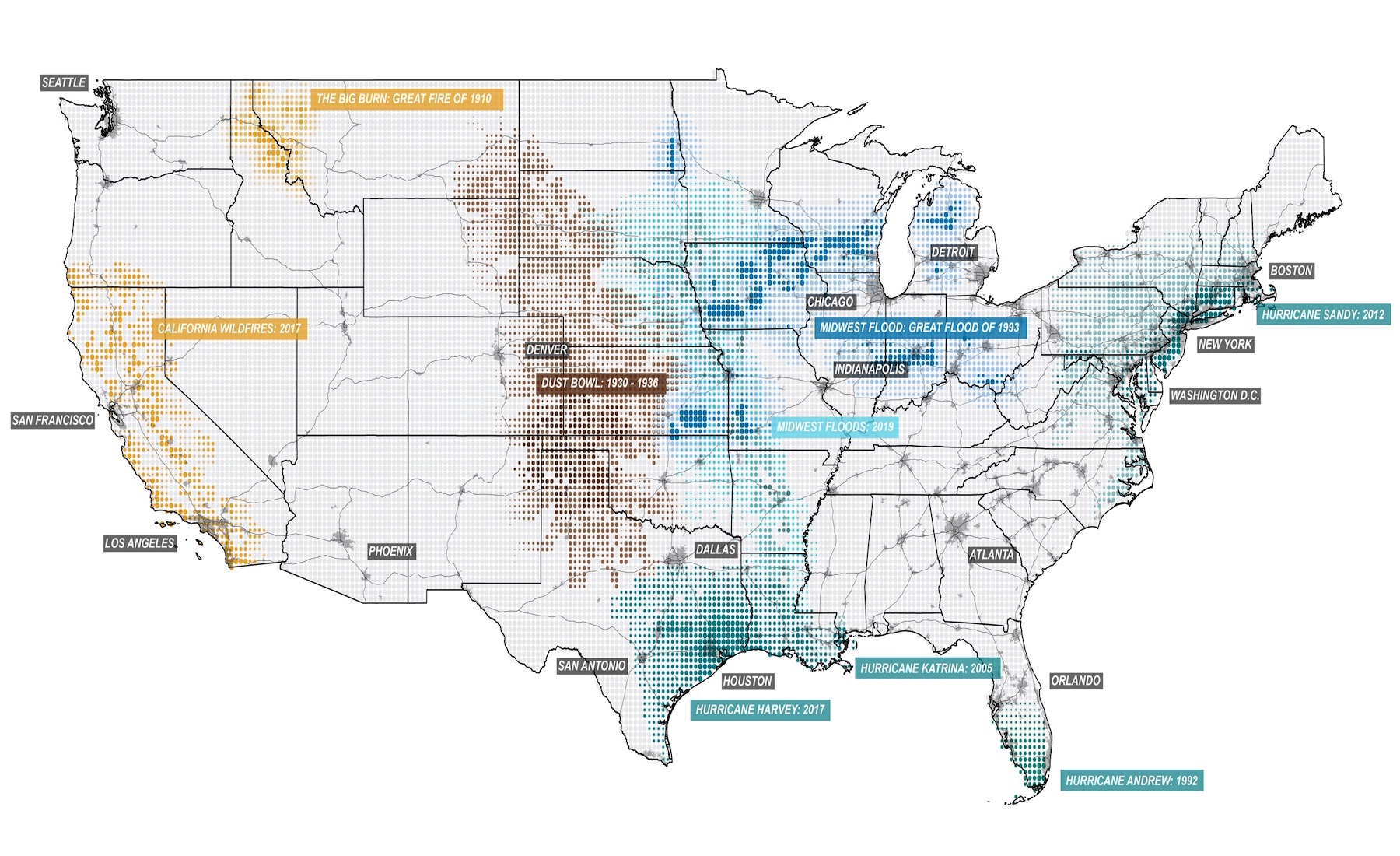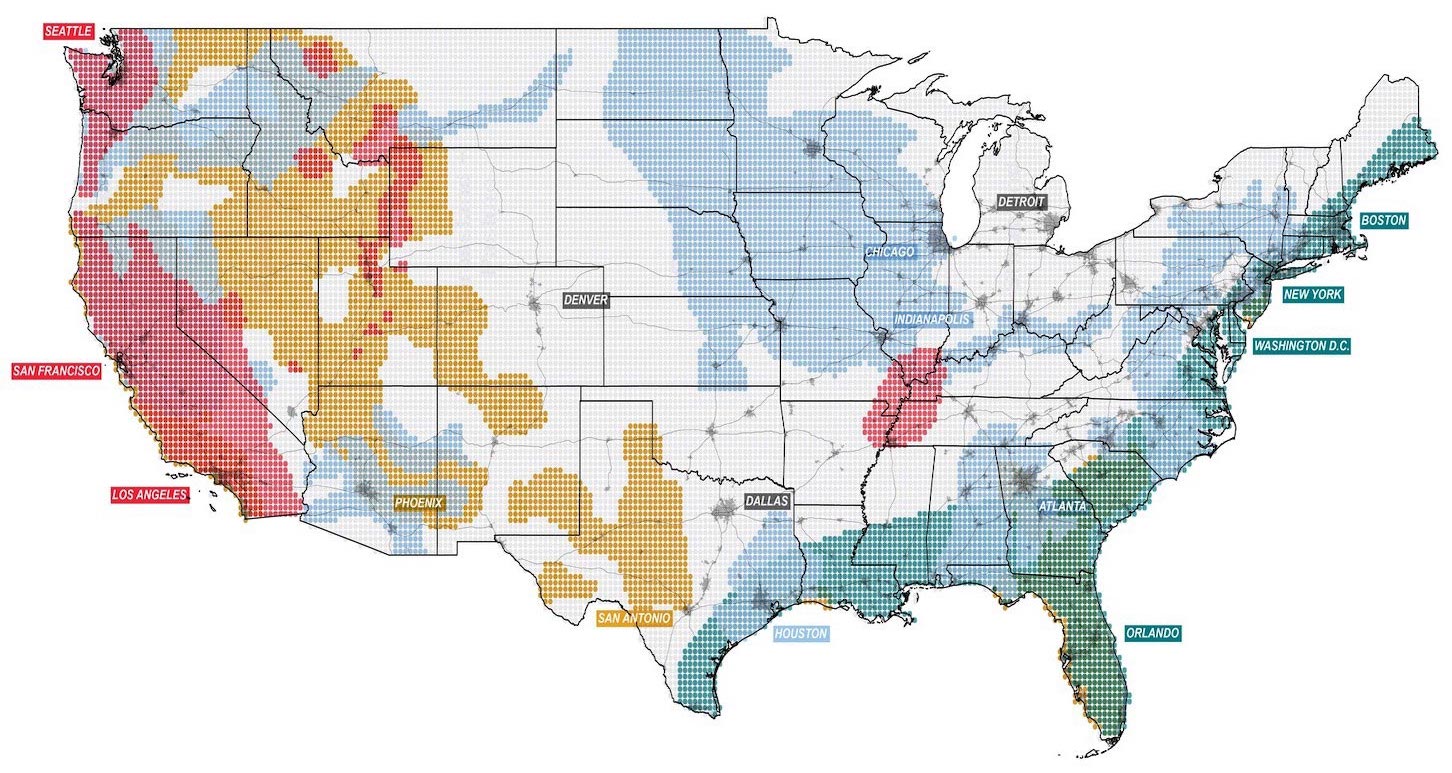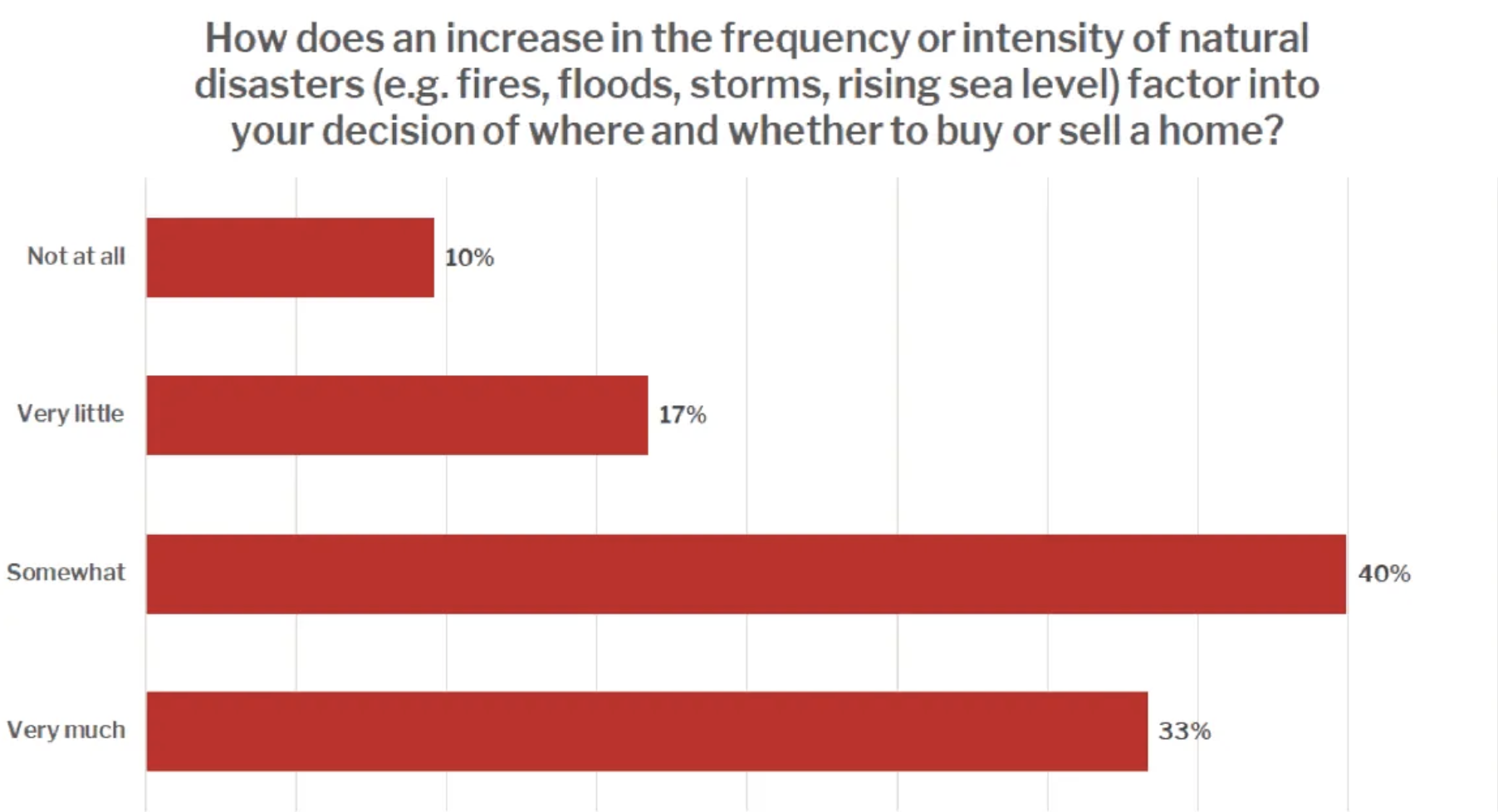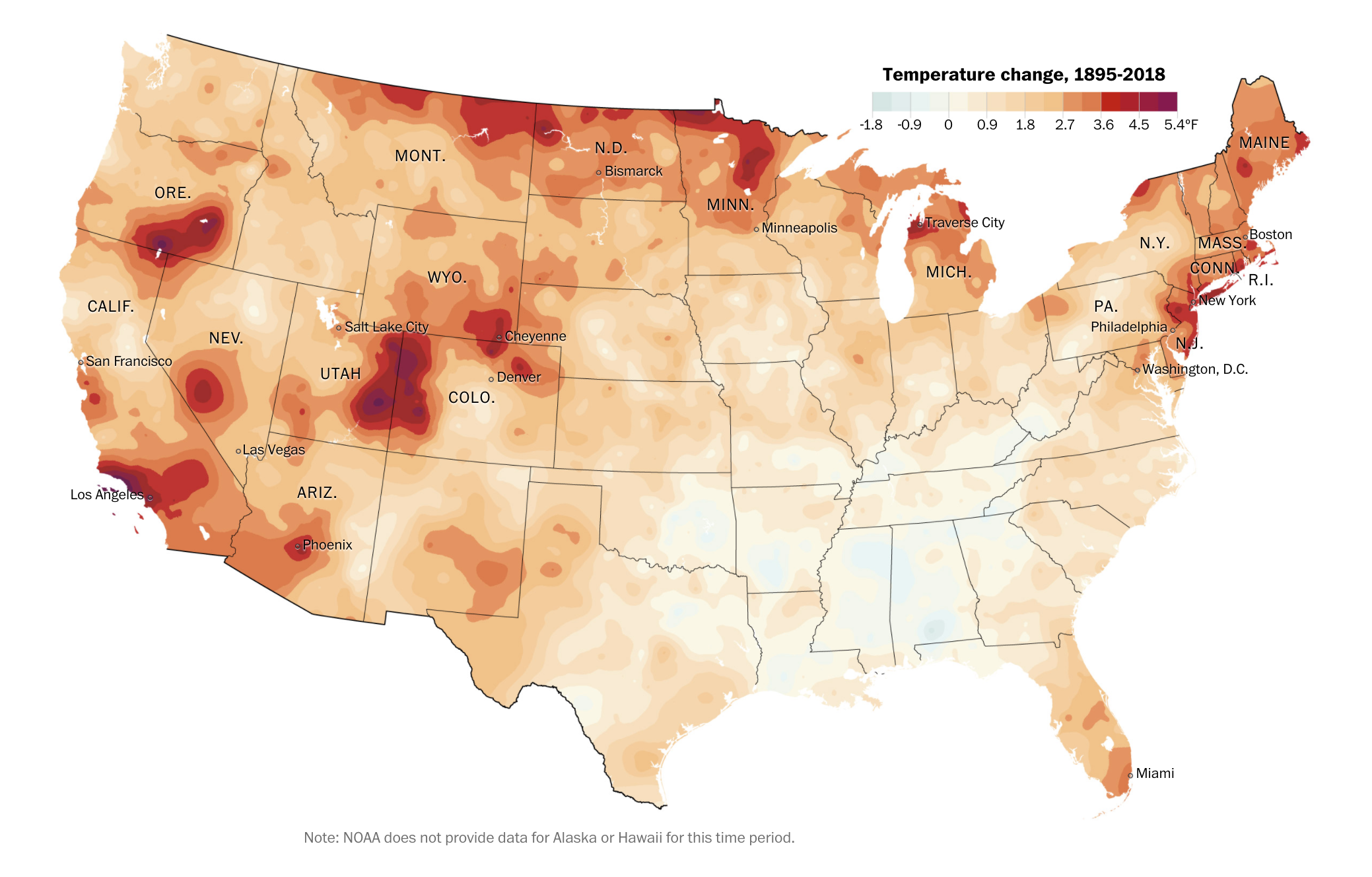Should climate change dictate where you buy a house?
Add “climate change” to your home buying checklist
It’s no longer possible to ignore the effects of climate change.
With wildfires, hurricanes, and other disasters threatening homes — especially along the coasts — it’s an issue at the forefront for homeowners.
But there’s still some uncertainty about home buying and climate change.
Are weather patterns still a secondary consideration? Or is it time to pick up and move to a safer region altogether?
Naturally, the answer will be different for everyone. But knowing the facts can help you make a more informed decision about where to buy.
We looked into the most- and least-at-risk areas to buy a house in the era of climate change and asked real estate experts for their advice.
Here’s what we learned.
Verify your home buying eligibility (Sep 16th, 2020)In this article (Skip to…)
Where is climate change already impacting real estate?
A recent Redfin survey showed that most Americans are thinking about climate change when they decide to buy or sell a house. But some are much more worried about its impact than others.
The highest concentrations of home buyers and sellers “very concerned” about the environment were in:
- Houston, TX (58%)
- New York City, NY (47%)
- Miami, FL (46%)
- Austin, TX (44%)
- Los Angeles, CA (43%)
- San Francisco, CA (41%)
- South Carolina (40%)
This shouldn’t come as a surprise. Most areas where people are “very concerned” are more vulnerable to the effects of climate change.
Climate change map: Natural disasters in the U.S. over 100 years
This map from the McHarg Center’s Atlas for a Green New Deal shows where some of the most severe environmental disasters have struck the U.S. in the past century.

Source: The McHarg Center
As The McHarg Center says, “With climate change, the number, frequency, and intensity of these events is likely to increase.”
So it makes sense that home buyers and sellers in those areas are considering climate change at the forefront.
But as its effects become more widespread, more home buyers will have to make climate change a primary consideration.
Climate change map: U.S. environmental risks by region
Climate change will impact each area of the U.S. differently.
Though it’s hard to answer the question of how much each region will be affected, scientists have a good idea of how climate change will strike.

Wildfires Earthquakes Floods Hurricanes
Source: The McHarg Center
A second map from The McHarg Center shows how different parts of the U.S. are likely to be affected by climate change; from wildfires to earthquakes, floods, and hurricanes.
Some homeowners have already felt its impacts, especially those affected by wildfires on the West Coast and hurricanes in the Southeast.
But so far, it hasn’t been enough to make most home buyers retreat to higher ground.
Homeowners are worried, but not moving yet
Nearly three in four home buyers and sellers say the intensity or frequency of natural disasters impacts their choice about where and whether to sell or purchase a home.
In fact, only 10% of home buyers said climate change doesn’t affect their decision-making process whatsoever.

Source: Redfin
But those worries haven’t led major changes to home prices or buying habits.
In the report, Redfin chief economist Daryl Fairweather said:
“Climate change is important to house hunters, but when it actually comes time to decide where to buy a home, it’s outweighed by other factors that feel more immediate, like affordability and access to jobs.”
“Climate change… [is] outweighed by other factors that feel more immediate, like affordability and access to jobs.” –Daryl Fairweather, Chief Economist, Redfin
“Environmental changes may be factoring into their thought processes, but not yet into their actions,” Fairweather continues.
But the effects of climate change are getting notably stronger each year, with wildfires, hurricanes, and warmer temperatures taking a bigger toll on the U.S.
With that in mind, do you need to think more seriously about climate change when you buy a house? Would it be worth even moving to a new city or state?
Home buying tips in the time of climate change
Of course, not everyone will make a home buying decision based on climate change.
Many people love the area they live in, and are willing to adapt rather than move.
But if you’re in a particularly at-risk area (say, one below sea-level) you might be considering a big move more seriously.
Either way, there are a few tips you can follow to make a better long-term home buying decision. According to the experts:
- Vet the area carefully. Perform a Google search of the market’s name along with “climate vulnerability assessment” to yield key research. “Find out how well the area is set up to handle emergency situations,” says Rick Sharga, president and CEO of CJ Patrick Company. . “In a natural disaster, are there enough roads to allow residents to evacuate? Are local first responder services adequate to provide relief? How far away are hospitals and other medical facilities?”
- Learn if the city/state has a Climate Action Plan and what those plans are
- Determine the cost and level of homeowners insurance protection you’ll need, including separate flood insurance (if needed). “Remember that insurance costs to cover flood, fire, and other natural disaster damages are likely to increase in areas facing increased climate change risks,” notes Phil Georgiades with FedHome Loan Centers
- Assess if the home can withstand different natural disasters. “If not, determine whether it can be renovated to make it safer,” Sharga adds. “Factor that into your purchase price”
That last piece of advice can be especially useful if you’re buying in an area at high risk for natural disasters.
It’s not just the location that matters — the home and its features make a big difference too.
By factoring safety features and necessary upgrades into your budget, you can make a home buying decision that offers more security (both physically and financially) in the long run.
Safer markets to consider when you buy a house
So what areas of the country could be safer for home buyers in light of climate change?
Different experts offer different advice.
But some metros and areas are consistently recommended as being possibly less affected by climate change and the natural disasters it can cause.
According to a survey or real estate professionals by BusinessInsider, these cities and their directly surrounding areas are at the top of the list:
- Tulsa, OK — Safer from sea-level rise
- Hartford, CT — Safer from sea-level rise
- Boulder, CO — Self-sufficient water supply
- Minneapolis/Saint Paul, MN — Sheltered from hurricanes and floods
- Charlotte, NC — Safer from hurricanes in the south
- Pittsburgh, PA — Less extreme cold
A paper published by researchers in 2016 also included the Upper Peninsula of Michigan; Seattle, WA; Northern Minnesota; and Portland, Oregon.
It suggested these areas could experience more moderate weather patterns and temperatures in the coming years that could make them safer havens in the era of climate change.
A Popular Science study also predicted that the West will continue to warm up and dry out, with wildfires expanding over larger areas and western states getting hotter by 6.5 degrees.
Climate change map: U.S. temperature changes
Some areas of the U.S. have already warmed considerably — by up to 5 degrees Fahrenheit over the past 120 years.

Image: Washington Press. Data: NOAA
These temperature changes will become more extreme in the coming years. This leads to more extreme weather risks in those same areas.
Insights from real estate experts
Sharga says the most obvious climate-related factors for home buyers to think about are areas prone to flooding and hurricanes.
“In addition to areas historically considered as flood zones, there’s reason to be concerned about coastal properties flooding, as sea levels continue to rise,” says Sharga.
“This includes coastal areas in the Southeast and extends along the Gulf Coast—impacting buyers in states like Alabama, Louisiana, and Texas.”
The most obvious climate-related factors for home buyers to think about are areas prone to flooding and hurricanes.
Also, buyers in the Western and Southwestern regions — including California, Arizona, and Colorado —need to pay close attention to areas prone to wildfires, Sharga adds.
Keith Baker is the Mortgage Banking Program coordinator and faculty at North Lake College. He says he’d consider relocating to areas like Boston, Massachusetts; Madison, Wisconsin; Denver, Colorado; and Minneapolis, Minnesota.
“Think about moving to areas where it is cooler now. Consider that temperatures are expected to rise an average of 6 degrees hotter in the middle of North America,” suggests Baker.
“Aim for higher ground areas, as some elevation can be helpful both for beating the heat and escaping flooding.” –Keith Baker, Mortgage Banking Program, North Lake College
“Aim for higher ground areas, as some elevation can be helpful both for beating the heat and escaping flooding. And live away from the coast, which will experience an eroded and shrunken coastline.”
Suzanne Hollander is a real estate attorney and Florida International University senior instructor. She advises using good common sense before buying in an area already known for natural disasters.
“In Florida, there’s always going to be risks for hurricanes and storm damage. In areas below sea level, you’re going to have to worry about flooding. In Tennessee, we just witnessed horrific tornadoes,” she says.
Climate change resources for home buyers
There are plenty of studies and interactive maps showing how climate change will affect particular regions, states, and cities in the U.S.
These can be great resources for potential homebuyers looking to make a safe investment.
The bottom line is that the effects of climate change are already here.
Many people will still be willing to buy in riskier areas, thanks to their other benefits — like beaches, forests, and waterways.
But making a strategic decision about the location and features of your home will be crucial to your safety and your investment in the long run.
So do your research, talk to real estate professionals in the area where you hope to buy, and be sure to balance your location desires with the risks they may present.
Verify your new rate (Sep 16th, 2020)Compare top refinance lenders
tinyurlis.gdv.gdv.htu.nuclck.ruulvis.netshrtco.detny.im
